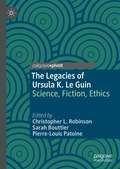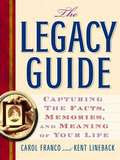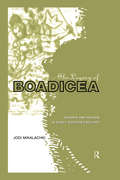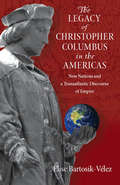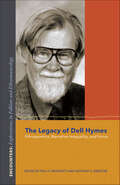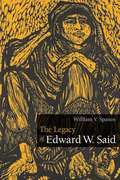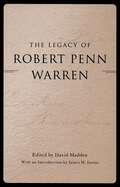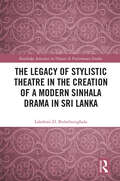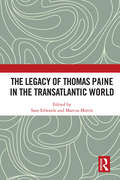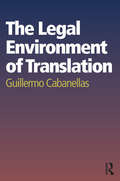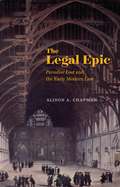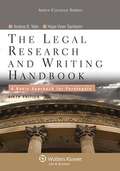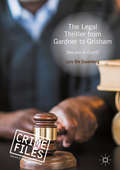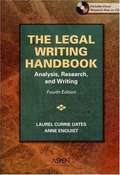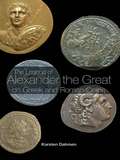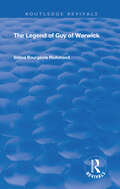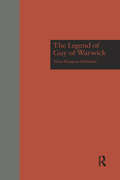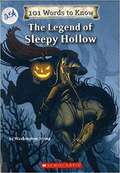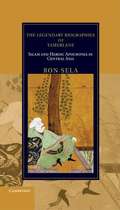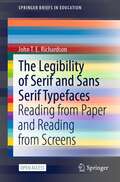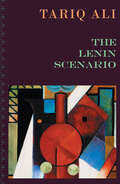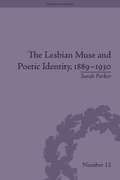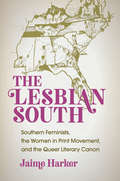- Table View
- List View
The Legacies of Ursula K. Le Guin: Science, Fiction, Ethics (Palgrave Studies in Science and Popular Culture)
by Christopher L. Robinson Sarah Bouttier Pierre-Louis PatoineThe Legacies of Ursula K. Le Guin explores how Le Guin’s fiction and essays have built a speculative ethical practice engaging indigenous knowledge and feminism, while crafting utopias in which human and other-than-human life forms enter into new relations. Her work also delineates new ways of making sense of the “science” of science fiction. The authors of this collection provide up-to-date discussions of well-known works as well as more experimental writings. Written in an accessible style, Legacies will appeal to any readers interested in literature, science fiction and fantasy, as well as specialists of science and technology studies, philosophy of science, ethics, gender studies, indigenous studies and posthumanism.
The Legacy Guide
by Kent Lineback Carol FrancoThe ultimate guide and companion for anyone who wants to record the story of his or her life or that of a loved one. Have you ever wondered about an ancestor you know only as a compelling face in a faded family photograph? Imagine discovering an entire book on this ancestor's life -one that described the world in which he lived and detailed his dreams, accomplishments, disappointments, and the accumulated wisdom of a lifetime. The Legacy Guide helps readers create such a book. Designed for writers and non-writers alike, it outlines a simple, intuitive, and highly flexible framework for turning your personal history-or that of a loved one-into a treasured family heirloom. It's been said that everyone has a story to tell, but anyone who has sat down to record his or her life story will tell you that there were moments of feeling completely overwhelmed and frustrated. Introducing the innovative program Facts to Memories to Meaning, The Legacy Guide takes you step-by-step through the seven stages of life-such as childhood, adolescence, young adulthood, etc. -to recall moments long forgotten and to discover their significance. And it helps you fashion these pieces together, much as you would a scrapbook, into a creative and compelling whole. Full of engaging and instructive quotations from the famous and the not-so-famous who have committed their stories to paper, The Legacy Guide will inspire you to capture the milestone events that have given shape to your life and allow you to weave them into a book that preserves this legacy for generations to come. .
The Legacy of Boadicea: Gender and Nation in Early Modern England
by Jodi MikalachkiThe Legacy of Boadicea explores the construction of personal and national identities in early modern England. It highlights the problems and anxieties of national identity in a nation with no native classical past. Written in an accessible style, The Legacy of Boadicea: * offers powerful new readings of the ancient British past in Shakespeare's King Lear and Cymbeline * persuasively illuminates a 'Boadicean' heritage in royal iconography, drama, and the social symptoms of religious dissent * articulates parallels between the eventual domestication of Britain's warrior queen in Restoration drama, and the social, political and legal decline in the status of women.
The Legacy of Christopher Columbus in the Americas: New Nations and a Transatlantic Discourse of Empire
by Elise Bartosik-VelezWhy is the capital of the United States named in part after Christopher Columbus, a Genoese explorer commissioned by Spain who never set foot on what would become the nation's mainland? Why did Spanish American nationalists in 1819 name a new independent republic "Colombia," after Columbus, the first representative of empire from which they recently broke free? These are only two of the introductory questions explored in The Legacy of Christopher Columbus in the Americas, a fundamental recasting of Columbus as an eminently powerful tool in imperial constructs.Bartosik-Velez seeks to explain the meaning of Christopher Columbus throughout the so-called New World, first in the British American colonies and the United States, as well as in Spanish America, during the eighteenth and nineteenth centuries. She argues that, during the pre- and post-revolutionary periods, New World societies commonly imagined themselves as legitimate and powerful independent political entities by comparing themselves to the classical empires of Greece and Rome. Columbus, who had been construed as a figure of empire for centuries, fit perfectly into that framework. By adopting him as a national symbol, New World nationalists appeal to Old World notions of empire.
The Legacy of Christopher Columbus in the Americas: New Nations and a Transatlantic Discourse of Empire
by Elise Bartosik-VelezWhy is the capital of the United States named in part after Christopher Columbus, a Genoese explorer commissioned by Spain who never set foot on what would become the nation's mainland? Why did Spanish American nationalists in 1819 name a new independent republic "Colombia," after Columbus, the first representative of the empire from which they had recently broken free? These are only two of the introductory questions explored in The Legacy of Christopher Columbus in the Americas, a fundamental recasting of Columbus as an eminently powerful tool in imperial constructs. Bartosik-Velez seeks to explain the meaning of Christopher Columbus throughout the so-called New World, first in the British American colonies and the United States, as well as in Spanish America, during the eighteenth and nineteenth centuries. She argues that during the pre- and post-revolutionary periods, New World societies commonly imagined themselves as legitimate and powerful independent political entities by comparing themselves to the classical empires of Greece and Rome. Columbus, who had been construed as a figure of empire for centuries, fit perfectly into that framework. By adopting him as a national symbol, New World nationalists appeal to Old World notions of empire.
The Legacy of Dell Hymes: Ethnopoetics, Narrative Inequality, and Voice (Encounters: Explorations In Folklore And Ethnomusicology Ser.)
by Anthony K. Webster Paul V. KroskrityThe accomplishments and enduring influence of renowned anthropologist Dell Hymes are showcased in these essays by leading practitioners in the field. Hymes (1927–2009) is arguably best known for his pioneering work in ethnopoetics, a studied approach to Native verbal art that elucidates cultural significance and aesthetic form. As these essays amply demonstrate, nearly six decades later ethnopoetics and Hymes's focus on narrative inequality and voice provide a still valuable critical lens for current research in anthropology and folklore. Through ethnopoetics, so much can be understood in diverse cultural settings and situations: gleaning the voices of individual Koryak storytellers and aesthetic sensibilities from century-old wax cylinder recordings; understanding the similarities and differences between Apache life stories told 58 years apart; how Navajo punning and an expressive device illuminate the work of a Navajo poet; decolonizing Western Mono and Yokuts stories by bringing to the surface the performances behind the texts written down by scholars long ago; and keenly appreciating the potency of language revitalization projects among First Nations communities in the Yukon and northwestern California. Fascinating and topical, these essays not only honor a legacy but also point the way forward.
The Legacy of Edward W. Said
by William V. SpanosWith the untimely death of Edward W. Said in 2003, various academic and public intellectuals worldwide have begun to reassess the writings of this powerful oppositional intellectual. Figures on the neoconservative right have already begun to discredit Said's work as that of a subversive intent on slandering America's benign global image and undermining its global authority. On the left, a significant number of oppositional intellectuals are eager to counter this neoconservative vilification, proffering a Said who, in marked opposition to the "anti-humanism" of the great poststructuralist thinkers who were his contemporaries--Jacques Derrida, Jean-Francois Lyotard, Jacques Lacan, Louis Althusser, and Michel Foucault--reaffirms humanism and thus rejects poststructuralist theory. In this provocative assessment of Edward Said's lifework, William V. Spanos argues that Said's lifelong anti-imperialist project is actually a fulfillment of the revolutionary possibilities of poststructuralist theory. Spanos examines Said, his legacy, and the various texts he wrote--including Orientalism,Culture and Imperialism, and Humanism and Democratic Criticism--that are now being considered for their lasting political impact.
The Legacy of Robert Penn Warren (Southern Literary Studies)
by David Madden James H. JustusRobert Penn Warren was unique among twentieth-century American writers for having achieved excellence in a broad and assorted range of genres: poems, novels, plays, critical works, historical essays, personal essays, biography, and innovative textbooks. In this collection of essays, critics and poets -- among the finest Warren scholars -- assess Warren's legacy within his various genres and illuminate his centrality to twentieth-century American culture. Although Warren was best known for his novel All the King's Men, the fact that most of these essays focus on his poetry attests to the urgency these poets and scholars feel about the need to call attention to this relatively neglected aspect of his work. Although their approaches and themes are varied, the pieces in The Legacy of Robert Penn Warren are united in their assertion that the writer's true legacy is that he was, in a century of increasing specialization, a myriad-minded Renaissance man.
The Legacy of Stylistic Theatre in the Creation of a Modern Sinhala Drama in Sri Lanka (ISSN)
by Lakshmi D. BulathsinghalaThis book explores the development of Sinhala stylistic drama from its earliest manifestations to the post-independence era.Bulathsinghala examines the impact of indigenous and imported folk theatrical forms on the work of the most significant postcolonial stylistic dramatists and on key plays that they produced. In the process, the book explores a number of myths and misunderstandings regarding Sri Lanka’s folk heritage and seeks to establish more reliable information on the principal indigenous Sri Lankan folk dramatic forms and their characteristics. At the same time, by drawing connections between folk drama and the post-independence stylistic theatrical movement, the author demonstrates the essential role of the former in Sinhala culture prior to the advent of Western and other influences and shows how both continue to inflect Sri Lankan drama today.This book will help to open the field of South Asian drama studies to an audience consisting not only of scholars and students but also of general readers who are interested in the fields of drama and theatre and Asian studies.
The Legacy of Thomas Paine in the Transatlantic World
by Sam Edwards Marcus MorrisAs early as 1892, Moncure Conway, the author of the first scholarly Paine biography, noted that whilst Paine’s life up to 1809 was certainly fascinating, his subsequent life – that is, his afterlife – was even more thrilling. Vilified by Theodore Roosevelt as a "filthy little atheist," yet employed by Ronald Reagan in his campaign to make America "great again," Paine’s words and ideas have been both celebrated and dismissed by generations of politicians and presidents. An Englishman by birth, an American by adoption, and a Frenchman by decree, Paine has been invoked and appropriated by groups and individuals across the transatlantic political spectrum. This was particularly apparent following the bicentennial of Paine’s death in 2009, an event that prompted new scholarship examining troublesome Tom’s ideas and ideals, whilst in Thetford, Lewes and New Rochelle – his three transatlantic "homes" – he was feted and commemorated. Yet despite all this interest, the precise forms and function of Paine’s post-mortem presence have still not received the attention they deserve. With essays authored by experts on both sides of the Atlantic (and beyond), this book examines the transatlantic afterlife of Thomas Paine, offering new insights into the ways in which he has been used and abused, remembered and represented, in the two hundred years since his death.
The Legal Environment of Translation
by Guillermo CabanellasTranslation is subject to a complex and unique set of legal rules that govern its various practical and intellectual aspects. These rules derive from very different legal areas, such as intellectual property and labour law. While useful from a strictly legal point of view, the heterogeneity of sources operates as a major hurdle in terms of understanding the overall legal framework within which translation operates. This book offers a general overview of the legal rules applicable to different aspects of translation, allowing translators and other interested parties to form a broad and coherent picture of the rules applicable in this area. It draws on the provisions of the main legal systems of the world, as well as the basic international agreements relevant in this area, thus offering both a comparative perspective of the legal issues involved and a guide to relevant national legal rules. In addition to a description and analysis of the legal issues and rules involved, the book also presents hypothetical cases, with a discussion of the problems they pose and possible solutions. It explains the theoretical structure of the rules under discussion as well as their practical implications. The language and methodology of the book are sufficiently accessible to allow lawyers, translators and those who require translation work but do not have a formal legal background to follow the arguments presented.
The Legal Epic: Paradise Lost and the Early Modern Law
by Alison A. ChapmanThe seventeenth century saw some of the most important jurisprudential changes in England’s history, yet the period has been largely overlooked in the rich field of literature and law. Helping to fill this gap, The Legal Epic is the first book to situate the great poet and polemicist John Milton at the center of late seventeenth-century legal history. Alison A. Chapman argues that Milton’s Paradise Lost sits at the apex of the early modern period’s long fascination with law and judicial processes. Milton’s world saw law and religion as linked disciplines and thought therefore that in different ways, both law and religion should reflect the will of God. Throughout Paradise Lost, Milton invites his readers to judge actions using not only reason and conscience but also core principles of early modern jurisprudence. Law thus informs Milton’s attempt to “justify the ways of God to men” and points readers toward the types of legal justice that should prevail on earth. Adding to the growing interest in the cultural history of law, The Legal Epic shows that England’s preeminent epic poem is also a sustained reflection on the role law plays in human society.
The Legal Research and Writing Handbook: A Basic Approach for Paralegals (6th Edition)
by Andrea B. Yelin Hope Viner SambornThe highly successful textbook on research and writing makes every step of the process accessible to paralegal students. The authors provide effective research tools, practical strategies and an efficient procedure for researching the law with both traditional and electronic sources. Step-by-step instruction leads students through each stage of activity, from prewriting to revising, and covers the IRAC method, legal memoranda, letters, and more. Invaluable pedagogy features examples, exhibits, expert writing tips,exercises, practice tips, ethics alerts, and web resources. Detailed subheadings provide quick access to topics, and appendices on helpful topics such as Shepardizing and Cite Checking, Citation and Sample Memoranda round out the presentation. The Student Workbook provides for extensive practice,sharpening research and writing skills. Thoroughly revised, the Sixth Edition presents new sample pages and updated exercises. Citation coverage has been updated to the 4th edition of ALWD and the 19th edition of The Bluebook . Inclusion of all the latest changes in legal research led to the revision of references, links, and examples. Students are now given more coaching on the practical aspects of outlining. The Instructor's Manual has expanded explanations, and answers to exercises and questions have been made clearer and more accessible. Hallmark features of The Legal Research and Writing Handbook:Accessible coverage of every step of the research and writing process Research tools and strategies teach an efficient process cover traditional and electronic sources Step-by-step instruction in legal writing process prewriting strategies to revising the IRAC method legal memoranda, letters, and more Excellent pedagogy examples and exhibits expert writing tips exercises practice tips ethics alerts web resources Detailed subheadings for quick access to topics Helpful appendices Shepardizing and Cite Checking Citation Sample Memoranda Student Workbook-extensive practice in research and writing skills ; Thoroughly updated, the revised Sixth Edition presents:New sample pages Citation coverage updated to 4th edition of ALWD and 19th edition of The Bluebook Latest changes in legal research Revised and updated material throughout:references links examples exercises More detail on practical aspects of outlining Thorough revision of the Instructor's Manual expanded explanations cogent and accessible answers to exercises and questions*Instructor's Manuals are a professional courtesy offered to professors only. For more information or to request a copy, please contact Wolter's Kluwer Law & Business at 800.529.7545 or examcopy@wolterskluwer.com.
The Legal Thriller from Gardner to Grisham
by Lars Ole SauerbergThis book offers a critically informed yet relaxed historical overview of the legal thriller, a unique contribution to crime fiction where most of the titles have been written by professionals such as lawyers and judges. The legal thriller typically uses court trials as the suspense-creating background for presenting legal issues reflecting a wide range of concerns, from corporate conflicts to private concerns, all in a dramatic but highly informed manner. With authors primarily from the USA and the UK, the genre is one which nonetheless enjoys a global reading audience. As well as providing a survey of the legal thriller, this book takes a gender-focused approach to analyzing recently published titles within the field. It also argues for the fascination of the legal thriller both in the way its narrative pattern parallels that of an actual court trial, and by the way it reflects, frequently quite critically, the concerns of contemporary society.
The Legal Writing Handbook: Analysis, Research, and Writing
by Anne Enquist Laurel Currie OatesStudents and professors will welcome this new edition of the only text for legal writing and research that covers all three key components of the first-year course -- research, writing, and analysis.
The Legend of Alexander the Great on Greek and Roman Coins
by Karsten DahmenThis outstanding introductory survey collects, presents and examines, for the very first time, the portraits and representations of Alexander the Great on the ancient coins of the Greek and Roman period. From 320 BC to AD 400, Karsten Dahmen examines not only Alexander’s own coinage and the posthumous coinages of his successors, but also the re-use of his image by rulers from the Greek world and the Roman empire, to late antiquity. Also including numismatic material that exceeds all previous published works, and well-illustrated, this historical survey brings Alexander and his legacy to life.
The Legend of Guy of Warwick (Garland Studies In Medieval Literature Ser.)
by Velma Bourgeois RichmondFirst published in 1996. This lavishly illustrated study is a comprehensive literary and social history which offers a record of changing genres, manuscript/book production, and cultural, political, and religious emphases by examining one of the most long lived popular legends in England. Guy of Warwick became part of history when he was named in chronicles and heraldic rolls. The power of the Earls of Warwick, especially Richard de Beauchamp, inspired the spread of the legend, but Guy's highest fame came in the Renaissance as one of the Nine Worthies. Widely praised in texts and allusions, Guy's feats were sung in ballads and celebrated on the stage in England and France.The first Anglo-Norman romance of Gui de Warewic, a Saxon hero of the tenth century was written in the early 13th century; the latest retellings of the legend are contemporary. Examples of Guy's legend can be found in two English translations that survived the Middle Ages, a new French prose romance, a didactic tale in the Gesta Romanorum, and late medieval versions in Celtic, German, and Catalan, as well as English. Guy remained a favorite Edwardian children's story and was featured in the Warwick Pageant, an historical extravaganza of 1906. The patriotism of World War II sparked a resurgence of interest that produced several new versions, mostly folkloric.
The Legend of Guy of Warwick (Garland Studies in Medieval Literature #14)
by Velma Bourgeois RichmondThis lavishly illustrated study is a comprehensive literary and social history which offers a record of changing genres, manuscript/book production, and cultural, political, and religious emphases by examining one of the most long lived popular legends in England. Guy of Warwick became part of history when he was named in chronicles and heraldic rolls. The power of the Earls of Warwick, especially Richard de Beauchamp, inspired the spread of the legend, but Guy's highest fame came in the Renaissance as one of the Nine Worthies. Widely praised in texts and allusions, Guy's feats were sung in ballads and celebrated on the stage in England and France.The first Anglo-Norman romance of Gui de Warewic, a Saxon hero of the tenth century was written in the early 13th century; the latest retellings of the legend are contemporary. Examples of Guy's legend can be found in two English translations that survived the Middle Ages, a new French prose romance, a didactic tale in the Gesta Romanorum, and late medieval versions in Celtic, German, and Catalan, as well as English. Guy remained a favorite Edwardian children's story and was featured in the Warwick Pageant, an historical extravaganza of 1906. The patriotism of World War II sparked a resurgence of interest that produced several new versions, mostly folkloric.
The Legend of Sleepy Hollow (101 Words to Know)
by Washington IrvingThis classic scary story features 101 challenging vocabulary words that everyone going into the 4th grade should know. Definitions are included, as well as word puzzles and games. And the story of Ichabod Crane's wild ride through Sleepy Hollow as he attempts to escape from a terrifying ghost is just plain fun to read!
The Legendary Biographies of Tamerlane
by Ron SelaTimur (or Tamerlane) is famous as the fourteenth-century conqueror of much of Central Eurasia and the founder of the Timurid dynasty. His reputation lived on in his native lands and reappeared some three centuries after his death in the form of fictional biographies, authored anonymously in Persian and Turkic. These biographies have become part of popular culture. Despite a direct continuity in their production from the eighteenth century to the present, they remain virtually unknown to people outside the region. This remarkable and rigorous scholarly appraisal of the legendary biographies of Tamerlane is the first of its kind in any language. The book sheds light not only on the character of Tamerlane and how he was remembered and championed by many generations after his demise, but also on the era in which the biographies were written, and how they were conceived and received by the local populace during an age of crisis in their own history.
The Legends of the Saints in Old Norse-Icelandic Prose
by Kirsten WolfSaints' legends form a substantial portion of Old Norse-Icelandic literature, and can be found in more than four hundred manuscripts or fragments of manuscripts dating from shortly before the twelfth century to the 1700s. With The Legends of the Saints in Old Norse-Icelandic Prose, Kirsten Wolf has undertaken a complete revision of the fifty-year-old handlist The Lives of the Saints in Old Norse Prose. This updated handlist organizes saints' names, manuscripts, and editions of individual lives with references to the approximate dates of the manuscripts, as well as modern Icelandic editions and translations. Each entry concludes with secondary literature about the legend in question. These features combine to make The Legends of the Saints in Old Norse-Icelandic Prose an invaluable resource for scholars and students in the field.
The Legibility of Serif and Sans Serif Typefaces: Reading from Paper and Reading from Screens (SpringerBriefs in Education)
by John T. RichardsonThis open access book provides a detailed and up-to-date account of the relevant literature on the legibility of different kinds of typefaces, which goes back over 140 years in the case of reading from paper and more than 50 years in the case of reading from screens. It describes the origins of serif and sans serif styles in ancient inscriptions, their adoption in modern printing techniques, and their legibility in different situations and in different populations of readers. It also examines recent research on the legibility of serif and sans serif typefaces when used with internet browsers, smartphones and other hand-held devices. The book investigates the difference in the legibility of serif typefaces and sans serif typefaces when they are used to produce printed material or when they are used to present material on computer monitors or other screens and it explores the differences in readers’ preferences among typefaces. The book’s main focus is on the psychology of reading, but there are clear implications for education and publishing. Indeed, the book can be read with benefit by anyone concerned with communicating with others through written text, whether it is printed on paper or displayed on computer screens.
The Lenin Scenario
by Tariq AliThe revolutionary world leader&’s extraordinary life, published for the centenary of Lenin&’s deathCommissioned by Oliver Stone in 2015 to commemorate the Russian Revolution, Tariq Ali&’s captivating screenplay of the life and times of Vladimir Lenin puts flesh on the bones of the historical record and gets its pulse racing. From the author of The Dilemmas of Lenin, the drama captures the enigma of its central character. Ali shows Lenin in his rush from Switzerland to Petrograd by train to grasp his moment in history and the force of his personality on the tumult he found there. He made a revolution and remade a nation. Interwoven with the politics is an exploration of Lenin&’s personal life, especially his love for Inessa Armand.In the introduction, Ali argues that, despite the difficulties, a serious cinematic assessment of Lenin is still needed. Unfortunately, two very different attempts to film one failed. This first draft provides the basis for something on a grander scale at some stage in the future.Praise for The Dilemmas of Lenin &‘Aims to rescue Lenin from both liberal caricature and Soviet hag- iography by recovering the realism and dynamism of his political thought&’ David Sessions, Nation&‘An incredibly powerful, panoramic, and insightful study of the central revolutionary figure of the twentieth century&’ Paul LeBlanc, author of Lenin and the Revolutionary Party
The Lesbian Muse and Poetic Identity, 1889–1930 (Gender and Genre #12)
by Sarah ParkerThroughout history the poetic muse has tended to be (a passive) female and the poet male. This dynamic caused problems for late Victorian and twentieth-century women poets; how could the muse be reclaimed and moved on from the passive role of old? Parker looks at fin-de-siècle and modernist lyric poets to investigate how they overcame these challenges and identifies three key strategies: the reconfiguring of the muse as a contemporary instead of a historical/mythological figure; the muse as a male figure; and an interchangeable poet/muse relationship, granting agency to both.
The Lesbian South: Southern Feminists, the Women in Print Movement, and the Queer Literary Canon
by Jaime HarkerIn this book, Jaime Harker uncovers a largely forgotten literary renaissance in southern letters. Anchored by a constellation of southern women, the Women in Print movement grew from the queer union of women's liberation, civil rights activism, gay liberation, and print culture. Broadly influential from the 1970s through the 1990s, the Women in Print movement created a network of writers, publishers, bookstores, and readers that fostered a remarkable array of literature. With the freedom that the Women in Print movement inspired, southern lesbian feminists remade southernness as a site of intersectional radicalism, transgressive sexuality, and liberatory space. Including in her study well-known authors—like Dorothy Allison and Alice Walker—as well as overlooked writers, publishers, and editors, Harker reconfigures the southern literary canon and the feminist canon, challenging histories of feminism and queer studies to include the south in a formative role.
